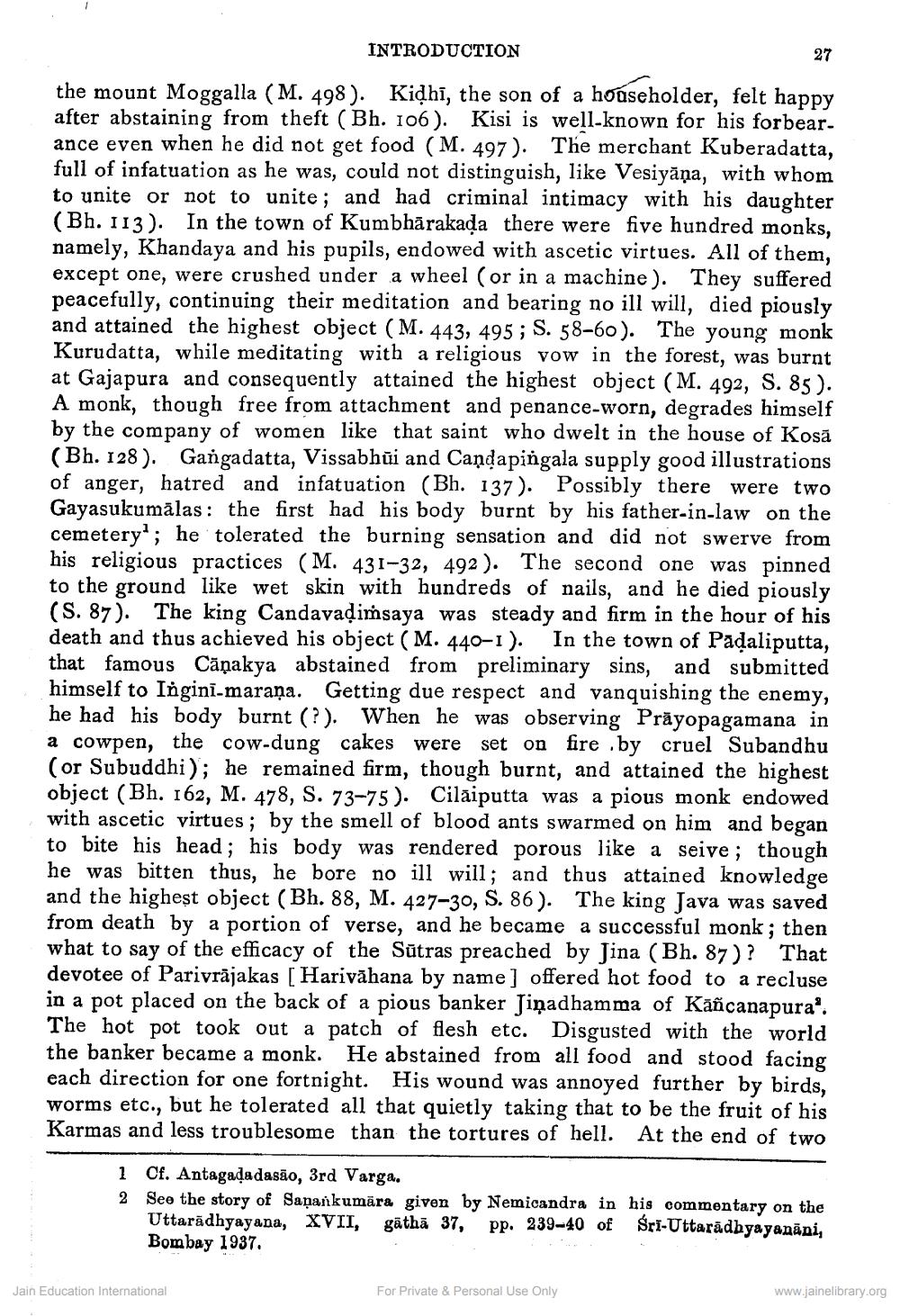________________
INTRODUCTION
the mount Moggalla (M. 498). Kidhi, the son of a householder, felt happy after abstaining from theft (Bh. 106). Kisi is well-known for his forbearance even when he did not get food (M. 497). The merchant Kuberadatta, full of infatuation as he was, could not distinguish, like Vesiyāņa, with whom to unite or not to unite; and had criminal intimacy with his daughter (Bh. 113). In the town of Kumbharakaḍa there were five hundred monks, namely, Khandaya and his pupils, endowed with ascetic virtues. All of them, except one, were crushed under a wheel (or in a machine). They suffered peacefully, continuing their meditation and bearing no ill will, died piously and attained the highest object (M. 443, 495; S. 58-60). The young monk Kurudatta, while meditating with a religious vow in the forest, was burnt at Gajapura and consequently attained the highest object (M.. 492, S. 85). A monk, though free from attachment and penance-worn, degrades himself by the company of women like that saint who dwelt in the house of Kosă (Bh. 128). Gangadatta, Vissabhui and Candapingala supply good illustrations of anger, hatred and infatuation (Bh. 137). Possibly there were two Gayasukumālas: the first had his body burnt by his father-in-law on the cemetery; he tolerated the burning sensation and did not swerve from his religious practices (M. 431-32, 492). The second one was pinned to the ground like wet skin with hundreds of nails, and he died piously (S. 87). The king Candavaḍimsaya was steady and firm in the hour of his death and thus achieved his object (M. 440-1). In the town of Paḍaliputta, that famous Caņakya abstained from preliminary sins, and submitted himself to Ingini-maraņa. Getting due respect and vanquishing the enemy, he had his body burnt (?). When he was observing Prayopagamana in a cowpen, the cow-dung cakes were set on fire by cruel Subandhu (or Subuddhi); he remained firm, though burnt, and attained the highest object (Bh. 162, M. 478, S. 73-75). Cilaiputta was a pious monk endowed with ascetic virtues; by the smell of blood ants swarmed on him and began to bite his head; his body was rendered porous like a seive; though he was bitten thus, he bore no ill will; and thus attained knowledge and the highest object (Bh. 88, M. 427-30, S. 86). The king Java was saved from death by a portion of verse, and he became a successful monk; then what to say of the efficacy of the Sutras preached by Jina (Bh. 87)? That devotee of Parivrajakas [ Harivahana by name] offered hot food to a recluse in a pot placed on the back of a pious banker Jinadhamma of Kañcanapura". The hot pot took out a patch of flesh etc. Disgusted with the world the banker became a monk. He abstained from all food and stood facing each direction for one fortnight. His wound was annoyed further by birds, worms etc., but he tolerated all that quietly taking that to be the fruit of his Karmas and less troublesome than the tortures of hell. At the end of two
1
2
Cf. Antagaḍadasão, 3rd Varga.
See the story of Sanankumara given by Nemicandra in his commentary on the Uttaradhyayana, XVII, gāthā 37, pp. 239-40 of Bombay 1937.
Śri-Uttaradhyayanāni,
Jain Education International
27
For Private & Personal Use Only
www.jainelibrary.org




